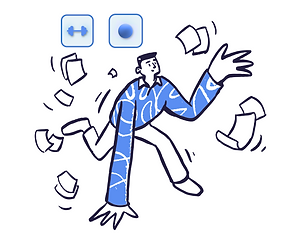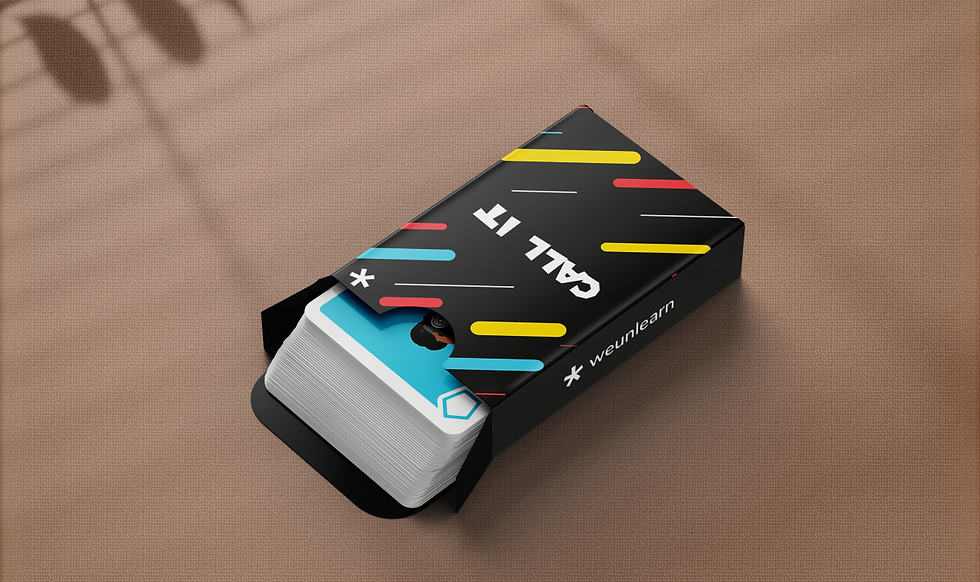
Call It - Game Design through UX Processes
Researched and Produced with the team at WeUnlearn, in collaboration with Dev Shah.

My Role & Skills
About
Product Designer, Illustrator, Marketing Lead
Research, Psychology, Game Design, Paper prototyping, Illustration, Iterative Design, Marketing, Print Production
Duration
6 Months, June -November 2020
The team
Call It started off as a 2 month plan in July, during an internship at WeUnlearn. While we had a rough idea about wanting to design an intervention that could help reduce gender stereotypes in people from a young age, we were otherwise running with a blank canvas. After many months of debate and iteration, we managed to produce a complete deck of cards, and ship it off to the printers (a whole other endeavour), so it’s now out for sale! If you’d like to deep dive into the process, find the Medium article here.
Dev Shah - Researcher, Designer
Meghna Chaudhury - Consultant, Mentor
Myself - Researcher, Designer
‘Call It’ explores the possibility that gender stereotyping might be reduced without explicitly addressing gender at all, with the illustrations and mechanics ensuring that players constantly process and accept counter-stereotypical roles.
Game Plan

Discovery
Stereotype formation
Prejudice reduction
Gender perceptions
Early stage development
Definition
The target users
The challenge
Our mission
Our timeline
Design
Intervention ideas
User testing plans
Reiterations
Final intervention
Delivery
Print testing
Printing
Full scale production
Marketing roadmap
Stereotypes
Beliefs about the characteristics of men and women, boys and girls. Regardless of family attitudes or values, mass media and peer interactions expose most children to messages about gender.


Impact
At their worst, gender assumptions present themselves as sexism or discrimination, affecting the weight given to women’s opinions, the opportunities open to them and beliefs about their capabilities.
In the workplace, they influence who is encouraged to go for promotions, apply for jobs, or asked to do administrative tasks.


Problem Statement

Challenging stereotype learning and acceptance in children at the formative age of 8 years (and potentially younger) through the design of a gamified research backed intervention that encourages children to begin early processing of counterstereotypical information.

CORE CONCEPT
In our search for concepts to counter and unlearn stereotypes, we came across research by developmental psychologists Rebecca S. Bigler and Lynn S. Liben.
They found that children with more advanced multi-classification skills have been found to be less rigid stereotypers than those with less advanced skills.
Multi-classification is the ability to identify that a person can belong to multiple categories at the same time.
Iterations


A multi-player card game involving professions and actions depicted with counter-stereotypical characters on colour and symbol marked cards. Players are encouraged to fill the blanks on each card with names of people around them, that evolve constantly.
Final Game Version

Design




Game Play

Credits
Call It was researched, tested and designed based on research by Rebecca Bigler and Lynn Liben, with the extremely talented Dev Shah, mentored by the brilliant mind of Meghna Chaudhury and marketed with the fantastic team at WeUnlearn. We did eventually manage to produce a complete deck, ship it off to the printers, and put it up for sale!
Our discussions held so many stories of stereotypical role playing games, of internalized societal dynamics, and how we each perceived the world a little differently because of our experiences. The Call It deck was our attempt at ensuring that the unlearning process, and the ability to notice and reject a stereotype could be learnt at a younger age, with a research and evidence based approach. Hopefully, this game will start more conversations within the space of gender research, about how we can tackle social issues with a design approach!
Read the longform article here for some more nuances.
© 2023 Malavika Vijayan. All Rights Reserved.
Made with love, Figma and many Vanilla Lattes
Write to me on @v.malavika297@gmail.com if something caught your eye. Always open to chat!




